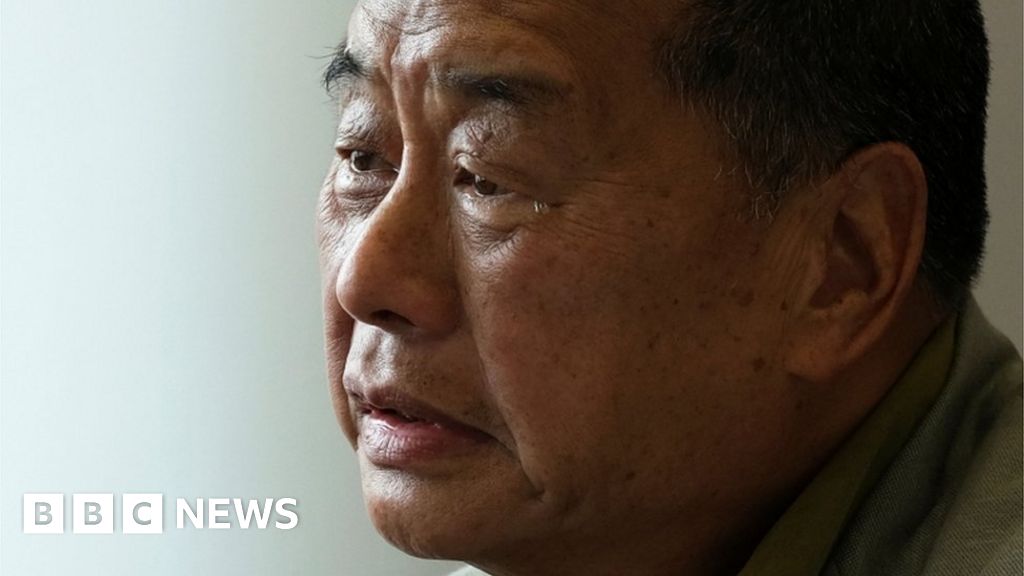Hong Kong Media Tycoon Jimmy Lai Ordered Back To Jail

- Published
image copyrightReuters
Hong Kong pro-democracy mogul Jimmy Lai has been ordered back to prison after the city's highest court ruled a judge may have erred in granting him bail.
The Apple Daily founder is accused of conspiring with foreign forces to endanger national security.
The 73-year old had spent the last week under house arrest after securing bail, but prosecutors appealed.
He is a fierce critic of China and the highest profile person charged under Hong Kong's controversial security law.
What did the court say?
Mr Lai has been in and out of detention over recent months. The Court of Final Appeal set his next bail hearing for 1 February after the prosecution argued a judge should not have released him on bail.
"We consider it reasonably arguable in the present case that the learned judge may have erred," the judges said in their ruling.
They cited Article 42 of the security law which states that "no bail shall be granted to a criminal suspect or defendant unless the judge has sufficient grounds for believing that the criminal suspect or defendant will not continue to commit acts endangering national security".
Mr Lai was first arrested under the law in August after a police raid on Apple Daily's head office, but was released on bail.
However, he was again placed in custody on 2 December, after being denied bail on a separate charge of fraud related to the lease of a building that houses the newspaper.
He was charged under the security law on 11 December and granted bail a second time on 23 December. Prosecutors immediately sought leave to appeal.
Thursday's court decision comes just days after activists who had tried to flee Hong Kong by boat were sentenced to between seven months and three years in jail.
Who is Jimmy Lai?
One of the city's most prominent supporters of the pro-democracy movement, Mr Lai is estimated to be worth more than $1bn (£766m). Having made his initial fortune in the clothing industry, he later ventured into media and founded Next Digital.
Next Digital publishes Apple Daily, a well-read tabloid which is frequently critical of the Hong Kong and mainland Chinese leadership.
In a local media landscape increasingly fearful of Beijing, Mr Lai is a persistent thorn for China - both through his publications and his writing.
It has seen him become a hero for many residents in Hong Kong but on the mainland he is viewed as a traitor who threatens Chinese national security.
Interviewed by the BBC before his arrest earlier in December, he said he would not give in to intimidation.
"If they can induce fear in you, that's the cheapest way to control you and the most effective way and they know it. The only way to defeat the way of intimidation is to face up to fear and don't let it frighten you."
What is in the National Security Law?
A former British colony, Hong Kong was handed back to China in 1997 but under the "one country, two systems" principle.
It was supposed to guarantee certain freedoms for the territory - including freedom of assembly and speech, an independent judiciary and some democratic rights - which mainland China does not have.
But the National Security Law has reduced Hong Kong's autonomy and made it easier to punish demonstrators.
The legislation introduced new crimes, including penalties of up to life in prison. Anyone found to have conspired with foreigners to provoke "hatred" of the Chinese government or the Hong Kong authorities may have committed a crime.
Trials can be held in secret and without a jury, and cases can be taken over by the mainland authorities. Mainland security personnel can legally operate in Hong Kong with impunity.
After the law was introduced, a number of pro-democracy groups disbanded out of fears for their safety.
The Chinese government defends the law, saying it will help return stability to the territory, which has been shaken by pro-democracy protests, and bring it more into line with the Chinese mainland.
From Chip War To Cloud War: The Next Frontier In Global Tech Competition
The global chip war, characterized by intense competition among nations and corporations for supremacy in semiconductor ... Read more
The High Stakes Of Tech Regulation: Security Risks And Market Dynamics
The influence of tech giants in the global economy continues to grow, raising crucial questions about how to balance sec... Read more
The Tyranny Of Instagram Interiors: Why It's Time To Break Free From Algorithm-Driven Aesthetics
Instagram has become a dominant force in shaping interior design trends, offering a seemingly endless stream of inspirat... Read more
The Data Crunch In AI: Strategies For Sustainability
Exploring solutions to the imminent exhaustion of internet data for AI training.As the artificial intelligence (AI) indu... Read more
Google Abandons Four-Year Effort To Remove Cookies From Chrome Browser
After four years of dedicated effort, Google has decided to abandon its plan to remove third-party cookies from its Chro... Read more
LinkedIn Embraces AI And Gamification To Drive User Engagement And Revenue
In an effort to tackle slowing revenue growth and enhance user engagement, LinkedIn is turning to artificial intelligenc... Read more

